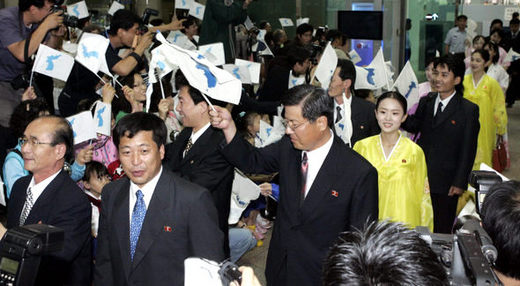 |
|
North Korean delegates are greeted with fanfare yesterday as they arrive in Gwangju, South Jeolla province, to participate in celebrations marking the anniversary of the 2000 inter-Korean conference and June 15 Joint Statement. Kim Jeong-hyo.
|
Delegates from both Koreas honor victims from S.K. democracy movement
A four-day festival marking the 6th anniversary of the June 15, 2000 South-North Joint Declaration and inter-Korean summit began yesterday in Gwangju, South Jeolla province. Official delegations of the two Koreas and representatives of Korean residents overseas participated in the festival, along with about 600 invited citizens.
The North’s top representative was Kim Yong-dae, chairman of the Council for Reconciliation of Korean People and vice president of the Presidium of the North Korean Supreme People’s Assembly.
Nearly 100 persons representing civic groups and the two Koreas visited the May 18 Cemetery in the Mangwol district of northern Gwangju, a site commemorating the hundreds, possibly thousands, of civilians who lost their lives in the May 18, 1980 pro-democracy uprising there, which was violently suppressed by the military.
Under a spring rain, visitors to the cemetery included the North’s Assemblyman Kim, who stood in silent tribute to the dead. The visitors then toured the grounds of the cemetery, observing the graves of those who fought for democracy in 1980. Assemblyman Kim wrote in a visitors’ book, "The spirit of the May 18 movement will be handed down through generations, together with the spirit of June 16 Joint Declaration." Regarding the Northern delegates’ visit to the cemetery, a site celebrating the democracy movement in South Korea, an official from the South said that Pyongyang had accepted Seoul’s proposal for the joint visit. This is not the first visit to a South Korean cemetary by a North Korean delegation. August last year, 32 North Korean delegates visited the National Cemetery in Seoul to mark the anniversary Korea’s independence from Japanese colonial rule. The National Cemetary also includes the graves of Korean War dead. At a press conference held at Gwangju airport before the North’s delegation’s arrival that morning, Paik Nak-chung, head of the South’s civic delegation, said, "Gwangju is a symbol of democratization, a place which sublimated its painful past into a hopeful future. Here, the warmth of national reunification is felt more strongly than in any other place. We will find the hope for reunification here with the June 15 festival, and we should do our best to make sure the festival is filled with the spirit of reconciliation and generosity rather than that of conflict and division." The North’s Kim Yong-dae arrived at Gwangju airport via a direct chartered flight from Pyongyang. While conversing with South Korea’s Unification Minister Lee Jong-seok at a hotel, Assemblyman Kim said, "People in the North also know about the history of Gwangju. Citizens in the North are deeply impressed by the farmers’ revolution in 1894, student protests against Japanese occupation in 1929 and the May 18 pro-democracy movement in 1980, all of which happened in Gwangju." Former president Kim Dae-jung participated in the celebration’s opening ceremony at the Gwangju World Cup Stadium, where he gave a speech underscoring the meaning of the June 15, 2000 Joint Declaration. About 30,000 spectators were present at the event.





